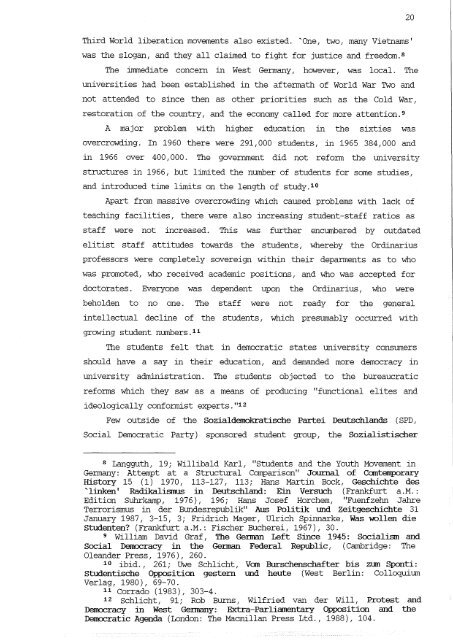Bruce Allen Scharlau PhD thesis - Research@StAndrews:FullText
Bruce Allen Scharlau PhD thesis - Research@StAndrews:FullText
Bruce Allen Scharlau PhD thesis - Research@StAndrews:FullText
You also want an ePaper? Increase the reach of your titles
YUMPU automatically turns print PDFs into web optimized ePapers that Google loves.
20<br />
Third World liberation movements also existed. 'One, two, many Vietnams'<br />
was the slogan, and they all claimed to fight for justice and freedom.8<br />
The immediate concern in West Germany, however, was local. The<br />
universities had been established in the aftermath of World War Two and<br />
not attended to since then as other priori ties such as the Cold War,<br />
restoration of the country, and the economy called for more attention. 9<br />
A major problem with higher education in the sixties was<br />
overcrowding. In 1960 there were 291,000 students, in 1965 384,000 and<br />
in 1966 over 400,000. The government did not reform the university<br />
structures in 1966, but limited the number of students for sane studies,<br />
and introduced time limits on the length of study.10<br />
Apart from massive overcrowding which caused problems with lack of<br />
teaching facilities, there were also increasing student-staff ratios as<br />
staff were not increased. This was further encumbered by outdated<br />
elitist staff attitudes towards the students, whereby the Ordinarius<br />
professors were completely sovereign wi thin their deparments as to who<br />
was promoted, who received academic positions, and who was accepted for<br />
doctorates. Everyone was dependent upon the Ordinarius, who were<br />
beholden to no one. The staff were not ready for the general<br />
intellectual decline of the students, which presumably occurred with<br />
growing student numbers.11<br />
The students fel t that in democratic states uni versi ty consumers<br />
should have a say in their education, and demanded more democracy in<br />
university administration. The students objected to the bureaucratic<br />
reforms which they saw as a means of producing "functional elites and<br />
ideologically conformist experts."12<br />
Few outside of the Sozialdernokratische Partei Deutschlands (SPD ,<br />
Social Democratic Party) sponsored student group, the Sozialistischer<br />
8 Langguth, 19; Willibald Karl, "Students and the Youth Movement in<br />
Germany: Attempt at a Structural Comparison" Journal of Contemporary<br />
History 15 (1) 1970, 113-127, 113; Hans Martin Bock, Geschichte des<br />
'linken' Radikalismus in Deutschland: Ein Versuch (Frankfurt a.M.:<br />
Edition Suhrkamp, 1976), 196; Hans Josef Horchem, "Fuenfzehn Jahre<br />
Terrorismus in der Bundesrepublik" Aus Politik lIDd Zeitgeschichte 31<br />
January 1987, 3-15, 3; Fridrich Mager, Ulrich Spinnarke, Was wollen die<br />
Studenten? (Frankfurt a.M.: Fischer Bucherei, 1967), 30.<br />
9 William David Graf, The German Left Since 1945: Socialism and<br />
Social Democracy in the German Federal Republic, ( Cambridge: The<br />
Oleander Press, 1976), 260.<br />
10 ibid., 261; Uwe Schlicht, Van Burschenschafter bis zum Sponti:<br />
Studentische Opposition gestern lIDd heute (West Berlin: Colloquium<br />
Verlag, 1980), 69-70.<br />
11 Corrado (1983), 303-4.<br />
12 Schlicht, 91; Rob Burns, Wilfried van der Will, Protest and<br />
Democracy in West Germany: Extra-Parliamentary Opposition and the<br />
Democratic Agenda (London: The Macmillan Press Ltd., 1988), 104.
















